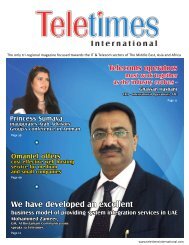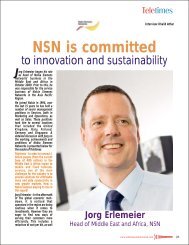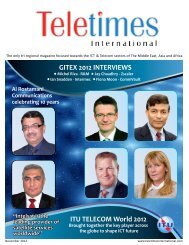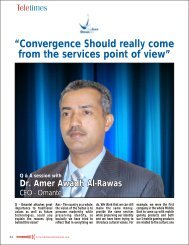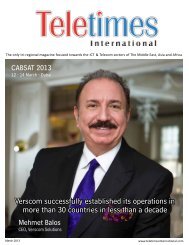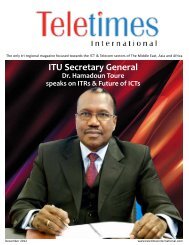Create successful ePaper yourself
Turn your PDF publications into a flip-book with our unique Google optimized e-Paper software.
Khalid AtharDoes Freedom of Expression has any boundary –Time to ThinkThe growth anddevelopmentof Information andCommunication Technologies(ICTs) today has led to theirwide diffusion and application,thus escalating their economicand social impact in anycountry. The forms and extentof the absorption of the ICTsare viewed as a barometer fora nation’s level of freedomand democracy, its commercialenergy, its desire to becomepart of the increasinglyinterconnected new worldorder and its empowermenttherein, and its vulnerabilities.The Internet is classified asone of the most promisinginnovation broughtin by Information andCommunication Technologies.Internet has become anessential part of the globalinformation society, enablingoverall economic growth,creating new jobs, encouragingmodernism and improvingnational competitiveness.The Internet today is oftendescribed as the last frontier forfree speech and expression, ananarchic and chaotic space forirrepressible political, religious,and personal expression.Freedom of speech andexpression in real life is fairlydelicate but while online, thereis a severe lack of regulationand moderation.Fraudulent anonymousmessages, personal bullying,hate speech or similar isexceedingly easy to do. One cansign up, enter in false detailsand write hated comments orupload similar type of contentwith nobody to ask for. On analarming side, the abusive useof freedom of expression andits existence over the Internetis causing incidents leading toglobal unrest and protest.Internet companies andplatforms such as Google,Facebook, YouTube, Twitterbased in the United States,have now became globalarbiters of freedom of speech,moderating complex issuesthat traditionally comeunder prefecture of Courts,Governments and Internationaltreaty. “Notice that Googlehas more power over this thaneither the Egyptian or the U.S.government,” said Tim Wu,a Columbia University lawprofessor. “Most free speechtoday has nothing to do withgovernments and everything todo with companies.”Recently, YouTube (www.youtube.com), a video sharingwebsite and subsidiary ofGoogle Inc. came into globalheadlines as video clips of amockery, anti-Islamic movie‘Innocence of Muslims’ wereuploaded on it. The low-budgetfilm incited a wave of seriousprotest across the Muslimworld; many people have diedso far in unrest connected tothe film in over 20 countriesincluding the U.S ambassador inLibya. It may also be noted thatdespite growing Internationalunrest stemming in part fromthe anti-Islamic film Google,YouTube’s parent company, hasdenied a White House’s requestto remove the film from itssearches and the YouTubestating that the company hassaid that the film does notviolate the company’s termsof service and communityguidelines. According toits spokesmen, YouTube’sCommunity Guidelines“encourage free speech” and“defend everyone’s right toexpress unpopular points ofview.”In response to directions madeby respective Governments,Google has blocked the anti-Islamic video in Malaysia,India, Indonesia, Saudi Arabia,Bahrain and Yemen whereas itrestricted viewers in Egypt andLibya from the video by itselfmaking special circumstancesin the country as the reasonbehind. Afghanistan, Pakistanand Bangladesh have alsoblocked complete access toYouTube after the video-sharingwebsite failed to take down theinitially obscure film.This recent shameless andtargeted happening is surelyinviting International debates.Need of the hour is to thinkthat “Is Freedom of expressiononline is a right or a privilege?”and “Is there any boundary forsuch abusive Freedom of expression”.It is the time to placesome legislations and definingInternational rules and law tounprotect efforts to abuse thefreedom of expression ratherupholding it.<strong>Teletimes</strong> Online Survey ReportDo you think ITRs(International Telecommunication Regulations)should be revised?Our latest online survey asked the participants to tell their views on the upcomingrevision of International Telecommunication Regulations in December. ITRsrevision is one of most debated issue on the global scene these days while bothproponents and opponents are having their say. The results show that majority (50%)of the respondents were in favor of the revision while 33% were not aware of the ITRsrevision. The following chart presents the detail of survey results.<strong>October</strong> <strong>2012</strong>www.teletimesinternational.com53



